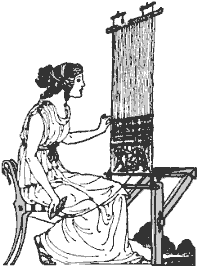
Arachne was a young woman from Lydia, who offended Athena, and suffered the consequences.
Arachne was gifted in the art of weaving. Not only were her finished products beautiful to look at, but the very act of her weaving was a sight to behold. Nymphs were said to abandon their frolicking to come observe Arachne practice her magic. So remarkable were her works that observers often commented that she must have been trained by the very patron goddess of weaving, Athena herself. Arachne scoffed at this. She was disgusted at being placed in an inferior place to the goddess and proclaimed that Athena herself could not do better than her.
Athena was quite perturbed at Arachne's bold claim, but she decided to give the young woman a chance to redeem herself. She came to Arachne disguised as an old woman and warned her to be careful not to offend the gods, lest she incur their wrath. But Arachne told the old woman to save her breath. She welcomed a contest with Athena, and, if she lost, would suffer whatever punishment the goddess deemed necessary.
The goddess accepted the challenge and revealed her true form. The nymphs who had come to watch Arachne's weaving shrunk back in fear, but Arachne stood her shaky ground. She had made a claim, and she was sticking to it. So the contest began, the mortal at her loom, the goddess at hers. Athena began to weave the scene of her contest with Poseidon for the city of Athens. A beautiful scene developed from the threads, showing Poseidon and the salt water spring, and Athena with an olive tree, gifts to the people who would name Athena as their patron, and their city after her. The bystanders marveled at the goddess' work.
Arachne, for her part, created a tapestry showcasing scenes of Zeus' various infidelities: Leda with the Swan, Europa with the bull, Danaë and the golden rain shower. So exquisite was the mortal's work that the bull seemed lifelike, swimming across the tapestry with a real girl on his shoulders. Even Athena herself was forced to admit that Arachne's work was flawless.
Angered at Arachne's challenge, as well as the presumptuousness of her choice of subjects, Athena tore the tapestry to pieces and destroyed the loom. Then she touched Arachne's forehead, making sure that she felt full guilt for her actions. Arachne was ashamed, but the guilt was far too deep for her poor, mortal mind. Depressed, she hanged herself.
Athena took pity on Arachne. She most likely did not expect that Arachne would commit suicide. She brought her back to life, but not as a human. By sprinkling her with the juices of aconite, Athena transformed the woman into a spider, her and her descendants to forever hang from threads and to be great weavers.
(by Melissa Lee)
No comments:
Post a Comment